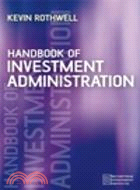| FindBook |
有 1 項符合
HANDBOOK OF INVESTMENT OF INVESTMENT ADMINISTRATI的圖書 |
 |
HANDBOOK OF INVESTMENT OF INVESTMENT ADMINISTRATI 作者:KEVIN ROTHWELL 出版社:JOHN WILEY & SONS,LTD 出版日期:2007-10-12 規格: / 520頁 |
| 圖書館借閱 |
| 國家圖書館 | 全國圖書書目資訊網 | 國立公共資訊圖書館 | 電子書服務平台 | MetaCat 跨館整合查詢 |
| 臺北市立圖書館 | 新北市立圖書館 | 基隆市公共圖書館 | 桃園市立圖書館 | 新竹縣公共圖書館 |
| 苗栗縣立圖書館 | 臺中市立圖書館 | 彰化縣公共圖書館 | 南投縣文化局 | 雲林縣公共圖書館 |
| 嘉義縣圖書館 | 臺南市立圖書館 | 高雄市立圖書館 | 屏東縣公共圖書館 | 宜蘭縣公共圖書館 |
| 花蓮縣文化局 | 臺東縣文化處 |
|
|
- 圖書簡介
Investment Administration has a key role to play in the many and varied investment products and services that are available in the retail investment marketplace. Kevin Rothwell’s Handbook of Investment Administration provides a comprehensive and readable source of both background and practical information for the practitioner. The Handbook takes the main aspects of investment administration and drills down into the detail of these from a retail perspective. It covers areas that are unique to the private client business such as trusts. It explains the background on why processes are undertaken providing as essential reference aid for the practitioner.
Key features include:
A full range of Investment Administration functions from New Business to Settlement through to Corporate Actions.
Specialist areas such as Trusts and Charities are covered in depth.
Concise introduction to each subject providing interesting background information, followed by a detailed review.
Essential reading for candidates undertaking Securities & Investment Institute IAQ exams examinations. - 作者簡介
Kevin Rothwell has spent his entire working life within the Financial Services Industry and his hands-on experience has given him a detailed knowledge of such areas as private client investment management, investment administration and dealing, settlement and custody. He has held senior posts in both front office and back office positions with and has undertaken a varied portfolio of investment projects.
More recently Kevin has set up his own company that excels in providing specialised and bespoke consultancy and training for a number of large financial institutions both at home and abroad.
Already a Fellow of the Securities and Investment Institute, he was delighted to have been made a Senior Technical Advisor for them. As well as teaching towards the Securities and Investment Institutes post-graduate Diploma in Investment Operations, Kevin is also the author of International Certificate in Financial Advice Workbook which is published by the SII. - 目次
About the author.
Introduction.
PART I: INTRODUCTORY ELEMENTS.
1. WEALTH MANAGEMENT.
1.1 Introduction.
1.2 Wealth management market.
1.3 Types of business.
1.4 Investment services and products.
1.5 Investment firms.
1.6 Investment administration.
PART II: INVESTMENT ADMINISTRATION.
2. NEW AND CLOSING BUSINESS.
2.1 Introduction.
2.2 New business.
2.3 Client types.
2.4 Know your customer.
2.5 Agreements.
2.6 Account opening.
2.7 Money laundering.
2.8 Validating the assets.
2.9 Transferring assets.
2.10 Raising assets.
2.11 Closing business and transfers.
2.12 Death of a client.
3. TRADING.
3.1 Introduction.
3.2 Stock market developments.
3.3 Equity trading.
3.4 Bond trading.
3.5 Regulation.
4. SETTLEMENT.
4.1 Introduction.
4.2 Fundamentals of settlement.
4.3 Settlement process.
4.4 UK settlement.
4.5 International settlement.
5. CORPORATE ACTIONS.
5.1 Introduction.
5.2 Corporate actions industry.
5.3 Types of event.
5.4 Private client corporate action processing.
5.5 Corporate events.
5.6 Income events.
PART III: OTHER CONSIDERATIONS.
6. CUSTODY.
6.1 Introduction.
6.2 Protection of client assets.
6.3 Segregation of safe custody assets..
6.4 Use of a custodian.
6.5 Nominee companies.
6.6 Global custodians.
6.7 Selecting a custodian.
6.8 Custody agreements and SLAs.
6.9 Reviewing the suitability of custodians.
7. TAX.
7.1 Introduction.
7.2 Income tax.
7.3 Tax treatment of dividends.
7.4 Capital gains tax.
7.5 Residence and domicile.
7.6 Withholding tax.
7.7 EU savings directive.
8. POWERS OF ATTORNEY.
8.1 Introduction.
8.2 Background.
8.3 Parties and terminology.
8.4 Enduring power of attorney.
8.5 Receiverships.
8.6 Mental capacity act 2005.
8.7 Administration.
9. OUTSOURCING.
9.1 Introduction.
9.2 Development of outsourcing.
9.3 Risks associated with outsourcing.
9.4 Regulatory principles.
PART IV: INVESTMENT ACCOUNTS AND PRODUCTS.
10. INDIVIDUAL SAVINGS ACCOUNTS (ISAS).
10.1 Introduction.
10.2 Development of ISAs and PEPs.
10.3 Organisation and regulation.
10.4 Individual savings accounts.
10.5 Allowable investments.
10.6 New and closing business.
10.7 Voids and repairs.
10.8 Residence.
10.9 Investor reporting.
10.10 Reform of the ISA regime.
11. COLLECTIVE INVESTMENT SCHEMES.
11.1 Introduction.
11.2 Regulation of UK funds.
11.3 Types of UK funds.
11.4 Fund administration .
11.5 Pricing.
11.6 Dealing and settlement.
11.7 Share register.
11.8 Dividend and interest distributions.
11.9 Investor reporting.
12. TRUSTS.
12.1 Introduction.
12.2 Development of trusts.
12.3 Fundamentals of trusts.
12.4 Investment administration.
13. CHARITIES.
13.1 Introduction.
13.2 What is a charity?
13.3 Legal background to investment by charities.
13.4 Trustee investment powers and duties.
13.5 Investment policy.
13.6 Appointing an investment manager.
13.7 Common investment funds.
13.8 Use of nominees and custodians.
14. SELF-INVESTED PERSONAL PENSIONS.
14.1 Introduction.
14.2 Development of SIPPs.
14.3 What is a SIPP?
14.4 Setting up a SIPP.
14.5 Eligibility and contributions.
14.6 Permitted investments.
14.7 Benefits.
15. DERIVATIVE PRODUCTS.
15.1 Introduction.
15.2 Types of derivatives.
15.3 Uses of derivates.
15.4 Derivatives markets.
15.5 Structured products.
15.6 Covered warrants.
15.7 Exchange traded commodities.
15.8 Contracts for difference.
Glossary.
Bibliography.
Reading Material.
Index.
|










